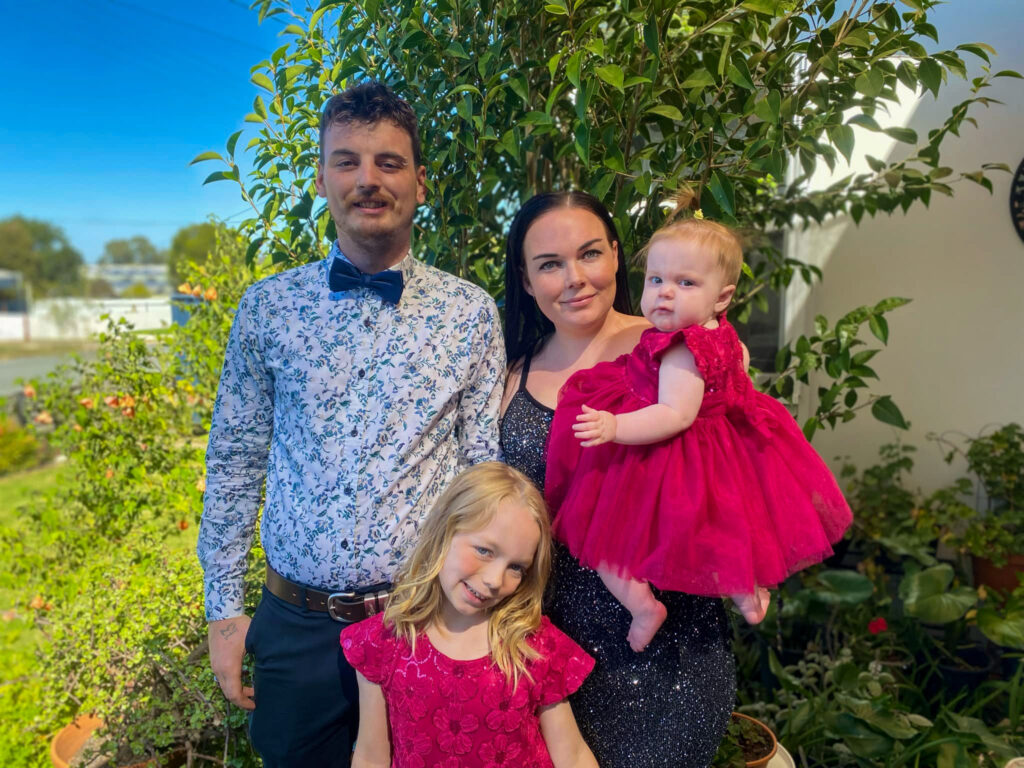The number of younger people being diagnosed with cancera disease where abnormal cells split without control and spread to other nearby body tissue and/or organs in Australia is rising, alongside missed opportunities for earlier diagnosisthe process of identifying a disease based on signs and symptoms, patient history and medical test results.
That’s been the experience of 35-year-old Wodonga mum-of-three, Tabitha Triplett, who has been diagnosed with stage 3C1 cervical cancer after spending months on a waiting list to see a specialist.
This Cervical Cancer Awareness Week (17 to 23 November), Tabitha is sharing her story to raise awareness of the barriers younger Australians face when navigating the cancer care system.
After an abnormal cervical screeningtesting for cancer or conditions that can lead to cancer before symptoms appear, also known as cancer screening result late last year, Tabitha was put on a waiting list to see a gynaecologist for further investigations. But after her first appointment was cancelled due to double-booking at the clinic, and Tabitha having to cancel her second appointment due to illness, she wasn’t able to re-book until July this year.
“My doctor assured me this often happens and doesn’t necessarily mean anything is wrong,” Tabitha said.
“At this point, I didn’t care too much about the delays with the appointment as I was told it was unlikely the results meant anything bad.”
But in May this year, while at work, Tabitha suddenly had extremely heavy bleeding. She visited Urgent Care, but they were unable to see what was wrong because there was too much bloodthe red bodily fluid that transports oxygen and other nutrients around the body and referred her to hospital.
By this time, Tabitha was soaking a maternity-style pad each hour, but at hospital, she was told it was probably “just a bad period”.
“I got frustrated at the doctor and told them that at 35 years of age, I was old enough to know what a period was like,” she said.
Finally, Tabitha had an ultrasounda type of medical imaging that uses soundwaves to create detailed images of the body , which found a 5cm growth on her cervix.
“Since then, it’s been a rollercoaster of appointments, scans, tests and procedures while still trying to maintain employment and normality to protect and support my children,” she said.
CEO of RCA, Christine Cockburn, commented on why it was important for decision makers in Canberra to be aware of this insidious disease and the experience many women, like Tabitha, are enduring.
“Cervical cancer often has no symptoms, making screening the best way to detect it, but long waits for specialists and the assumption young people can’t be seriously ill can lead to delayed diagnoses,” she said.
“While much of the discussion about cervical cancer focuses on prevention through the cervical cancer vaccine, and early detection through regular screening, stories like Tabitha’s show people are still slipping through the cracks.
“While Tabitha’s cancer is rare, her experience is not. People diagnosed with rare and less common cancers are more likely to experience delays, misdiagnosis, financial toxicity and barriers to standard-of-care treatments,” she said.
Tabitha’s treatment includes radiotherapy, chemotherapya cancer treatment that uses drugs to kill or slow the growth of cancer cells, while minimising damage to healthy cells, brachytherapy and immunotherapya treatment that uses a person's immune system to fight cancer.
She also learned that immunotherapy – considered her best hope for long-term survival – was not subsidised on the PBS for her specific diagnosis. This left her facing a $61,000 bill for two years of treatment.
“I went into the appointment worried about covering the loss of my wage, and I left realising that was nothing compared to the cost of treatment,” she recalls.
After launching crowdfunding and paying more than $20,000 to start treatment, Tabitha has now thankfully been granted compassionate access to complete her immunotherapy – a relief she describes as “life-changing”.
Tabitha’s experience underscores the urgent need for timely diagnosis, genomic-led care and treatment, and supportive care that meets the needs of younger patients, including support managing work, finances and mental health.
“I do not want anyone else to go through what I did,” Tabitha said.
RCA Media Contact
Alicia Ballesty
Head of Strategic Communications
0499 880 742
[email protected]
